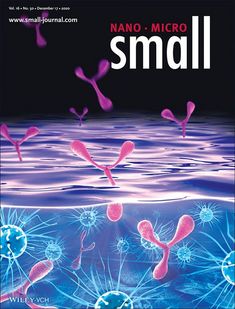BOKU research featured on the cover of "Small"
In close cooperation between the Institute of Chemistry of Renewable Resources (BOKU) and the Aalto University in Finland, a sustainable method to produce functional cellulose nanoparticles has been developed. In contrast to conventional nanocelluloses, these particles have a "soft" and chemically accessible surface structure and are therefore particularly suitable for the immobilization of proteins. Compared to polymers commonly used for this purpose, a much higher density of proteins can be achieved by such soft coatings. This is, among others, promising for use in rapid antigen tests, where it could further increase the sensitivity of current paper test strips. The paper was published in the renowned journal "Small" and selected as journal cover. The project was led by Prof. Orlando Rojas (Aalto) and Dr. Marco Beaumont (BOKU) and is the result of close transnational cooperation between research groups at BOKU, Aalto University, the University of Bayreuth and the University of British Columbia.
Dr. Marco Beaumont is currently an Erwin-Schrödinger fellow at the Institute of Chemistry for Renewable Resources (BOKU) and the School of Chemistry and Physics at Queensland University of Technology (Brisbane, Australia). In his research, he works on the development of new chemical tools for sustainable production of functional nanocelluloses.
More information can be found here:
https://onlinelibrary.wiley.com/doi/10.1002/smll.202070270
https://onlinelibrary.wiley.com/doi/full/10.1002/smll.202004702

